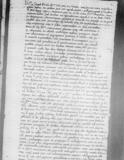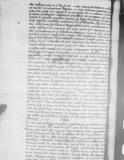Quod Dominatio Vestra Reverendissima ⌊⌋ suis XX huius datis ⌊⌋ responderit, gratiam habeo. Ex quibus fuit mihi oppido gratum intelligere, quod se tandem serenissimae ⌊maiestati regiae⌋ offerre statuerit. Qua in re Dominationem Vestram Reverendissimam aliquoties commonefacere volui, sed verebar, ne offenderem. Quodsi in ea aula, Deo sic disponente, convenerimus, agnoscet se secus de me sensisse in eo, quod scribit, a(n)i(mu)m suum perculisse, quam mentis nostrae sit institutum exonerationemque conscientiae meae et fidei non tendere in patriae perniciem, quemadmodum Dominationi Vestrae Reverendissimae interpretari placuit, neque ulla acerbitatis et male affectae voluntatis in illam mihi inesse iudicia percipiet. Quod vero fraterne me cohortatur non praecipitare sententiam et consilia atque, posthabitis patriae et meorum rationibus, non severitate et acrimonia, quam mihi inesse non puto, sed prudentia et moderatione mihi esse utendum, libenter quidem accipio, verum his duobus ultimis nemo est, qui non egeat, videoque, si quando mihi haec duo desunt, commune mihi id esse et cum Dominatione Vestra Reverendissima, et cum multis aliis etc.
Incendia facile excitari ferociaque co(n)si stain⌈[si]si stain⌉lia impingere et consultori minuere fidem periculososque esse ictus resultante malleo, ut recte philosophatum probo, ita ea in me haerere non velim, qui longe ad mitiora, Deo id largiente, animum meum induxi. Qui secus de me sentiunt, penitius me non norunt, et quod prius scripsi, odiosa eiusmodi iudicia ne pili quidem facio, modo id praestem, quod Deo meo et ⌊principi⌋, cui me Deus subesse voluit, debeo. Hoc, in quo mihi et meis, et patriae sum debitor, quemadmodum feci hucusque, facere non sum desiturus. De memoria nominis, modo illud cum iniuria sugilletur, non est, quod me infelicem reddere possit. Qui enim hominibus placent, confusi sunt et Deus sprevit eos, maxime autem nostri temporis impietate infectis hominibus. Et ne omnia, quae Dominatio Vestra Reverendissima prolixe et amice scripsit, persequar, hoc adhuc addendum putavi me de his neminem scire, qui suis affectibus written over s⌈sbusbus written over s⌉ studentes me contra quempiam incitare valeant. Si Dominatio Vestra Reverendissima hunc unum sibi persuasit esse de iis, cuius novissimas ad me litteras adiunxi, quas remitti peto, non existimo, cum eas littera written over i⌈iaa written over i⌉s legerit, de bono viro Dominationem Vestram Reverendissimam illius modi opinionem habituram etc.
De gangrena et quae scribit, testibus lacrimis, quarum non memini written over ...⌈... illegible⌈...... illegible⌉minimini written over ...⌉, me esse pollicitum et de plerisque aliis, quae uberiore responsione opus habent, non est, quod me in praesens, deficiente otio, in multa ad aulam scriptione occupem. De quibus aliquando vel litteris, vel coram fusius. Gratiamque Dominationi Vestrae Reverendissimae ago, quod me in eo, quae illi displicere videntur, sub ea adeo libera libertate commonuit, utque me in ea vicissim, sed paucis, audiat, amice velim. Mihi quidem omnia, quae per Dominationem Vestram Reverendissimam fiunt, probantur, etiam ea propensio et indulgentia, qua in suos utitur, si non plus aliquantulum aequo written over i⌈ioo written over i⌉ se exsereret. Quae res ne alias illi incommodet, subvereor, nihilominus pro foedere inter nos inito, cuius Dominatio Vestra Reverendissima meminit, ubi ⌊patrueli⌋ eius, quem a multis annis dilexi, neque umquam, quod scio, mihi adversantem agnovi, ubi, inquam, illi ex re et usu esse possum, quoad eius a me fieri potest, meam offero operam.
Satis mirari nequeo, immo et dolenter fero, quod in me faba  AAWO, AB, D. 2, f. 123v illa cuditur, cum ex se ⌊rex⌋ et non ex me citationem dederit. Mihine text damaged⌈[e]e text damaged⌉ ea vis est, ut voluntatem regiam in mea habeam potestate? Aut cf. Pl. Trin. 207 sciunt id quod in aurem rex reginae dixerit ⌊con text damaged⌈[on]on text damaged⌉scius sim,
quid rex reginae, ut in proverbio est, in auremcf. Pl. Trin. 207 sciunt id quod in aurem rex reginae dixerit ⌋? Statuant se vocati, intelligent causam et quis ill written over e⌈eillill written over e⌉orum sit accusator, ego sane illis paper damaged⌈[is]is paper damaged⌉ sancte et sincere consulere ausim, ut regiae clementiae, in qua nihil umquam asperius insedisse auditum est, se committant. Etsi ⌊fratres⌋ mei, qui paper damaged⌈[i]i paper damaged⌉ duo mihi sunt, ad ⌊tribunal regium⌋ postularentur, quemadmodum in hac causa factum est, etiamsi ipsa causa mihi esset incognita, omnino illis persuaderem, ut se statuerent, oboedientia enim et non victima quaeritur.
AAWO, AB, D. 2, f. 123v illa cuditur, cum ex se ⌊rex⌋ et non ex me citationem dederit. Mihine text damaged⌈[e]e text damaged⌉ ea vis est, ut voluntatem regiam in mea habeam potestate? Aut cf. Pl. Trin. 207 sciunt id quod in aurem rex reginae dixerit ⌊con text damaged⌈[on]on text damaged⌉scius sim,
quid rex reginae, ut in proverbio est, in auremcf. Pl. Trin. 207 sciunt id quod in aurem rex reginae dixerit ⌋? Statuant se vocati, intelligent causam et quis ill written over e⌈eillill written over e⌉orum sit accusator, ego sane illis paper damaged⌈[is]is paper damaged⌉ sancte et sincere consulere ausim, ut regiae clementiae, in qua nihil umquam asperius insedisse auditum est, se committant. Etsi ⌊fratres⌋ mei, qui paper damaged⌈[i]i paper damaged⌉ duo mihi sunt, ad ⌊tribunal regium⌋ postularentur, quemadmodum in hac causa factum est, etiamsi ipsa causa mihi esset incognita, omnino illis persuaderem, ut se statuerent, oboedientia enim et non victima quaeritur.
Ceterum, quod mihi nuper dominus ⌊castellanus Gedanensis⌋ cum sua et domini ⌊palatini Marienburgensis⌋ sententia scripsit, praeter voluntatem scilicet domini ⌊Ioannis a Werden⌋ ob eam citationem XVI huius, ⌊Gedani⌋ communitatem ad praetorium vocatam fuisse et, ut huc rumor pervenit, de communi consilio inibi statutum esse, ne ⌊citati⌋ compareant. Hoc quidem duobus istis bonis ⌊viris⌋ posset incommodare non parum, et quidem haec superinscribed, in the hand of Dantiscus⌈haechaec superinscribed, in the hand of Dantiscus⌉ ferocia sunt consilia, quae malus manet exitus. Nihilosecius ea, quae ⌊dominis consiliariis⌋, quorum Dominatio Vestra Reverendissima mihi misit litteras, visa sunt ⌊citatis⌋ expedire, quantum fieri potest maturius, ⌊serenissimae maiestati regiae⌋ diligenter sum perscripturus.
Nuntius ta text damaged⌈[ta]ta text damaged⌉men meus ob angustiam temporis ad dictum diem adesse nequit, aderit autem paulo post, sunt enim in his votis ⌊dominorum⌋ colligendis non pauca scribenda, qui tamen non ad singula, quae ⌊maiestas regia⌋ scripsit, respondent, quod si gratum erit, nescio etc. De commissariis non petimus, ut sint alienigenae, sed ut in his terris designentur, dummodo obtineri poterint. Addubito, an ⌊maiestas regia⌋ ⌊dominis consiliariis⌋ causam hanc sit commissura, qui se parti favere aperte declararunt. A me nihil operae praetermittetur, si quo pacto paper damaged⌈[to]to paper damaged⌉ causam hanc ad nos retrahere possimus. De ⌊palatinatu Culmensi⌋ rebusque aliis, cum breve sit nobis ad aulam profectionis tempus, tractatus differendos existimo, quandoquidem illic omnia opportunius transimus, ubi Dominationem Vestram Reverendissimam, Deo bene favente, adeo videbo libenter, ut nusquam libe paper damaged⌈[e]e paper damaged⌉ntius.
Quam rogo, ut hanc meam tumultuariam dictaturam ex sincero certe animo profectam, non secus atque mutuo nostro inter nos amori convenit, amicissime suscipiat. Cui, inquam, amori me intime commendo utque in dies fiat auctior et firmior, ex animo cupio.
 AAWO, AB, D. 2, f. 123v illa cuditur, cum ex se
AAWO, AB, D. 2, f. 123v illa cuditur, cum ex se 

